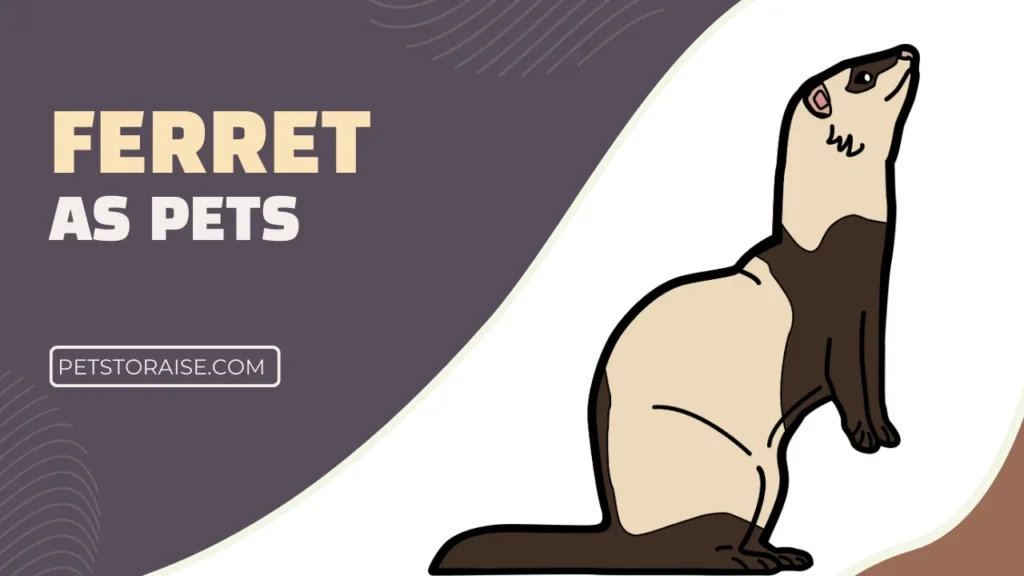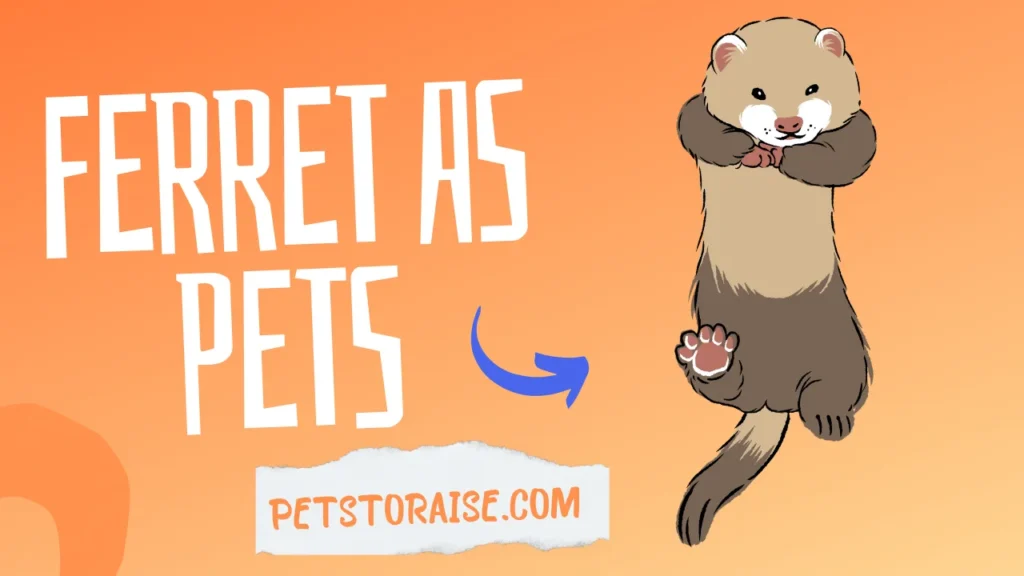Ferrets As Pets are small, domesticated animals belonging to the Mustelid family, closely related to weasels and otters. They have been kept Ferret As Pets for over 2,000 years. Ferret with their enchanting charm and lively demeanor, offer a delightful exploration into the animal kingdom. These small, agile mammals belong to the Mustelidae family, sharing ancestry with weasels and otters. Renowned for their curious nature and playful antics, ferrets captivate both novice pet owners and seasoned enthusiasts alike.
- Ferret As Pets Choosing Best Guidelines
- Exploring the Fascinating World of Ferret As Pets
- Nurturing a Healthy Relationship with Your Ferret As Pets Companion
- The Crucial Role of Hand Hygiene in Ferret As Pets Care
- Understanding and Preventing Ferret As Pets Nipping and Scratching
- Effective Strategies to Manage Ferret As Pets Biting and Scratching Incidents
- A Comprehensive Guide to Choosing the Ideal Ferret As Pets Companion
- Creating a Cozy Sanctuary for Your Beloved Ferret
- Ensuring Holistic Care for Your Cherished Ferret As Pets
- Frequently Asked Question About Choosing the Ideal Ferret
Ferret As Pets Choosing Best Guidelines
Ferrets possess distinct personalities, each with its own quirks and preferences. Some may be mischievous and adventurous, while others exhibit a more laid-back demeanor, preferring cozy naps in warm corners. Their unique characteristics make them fascinating companions, capable of forming strong bonds with their human caretakers.
Exploring the Fascinating World of Ferret As Pets
One of the most alluring aspects of ferrets is their boundless energy and inquisitive behavior. They thrive in environments that stimulate their senses, eagerly exploring tunnels, toys, and new surroundings with unbridled enthusiasm. From scampering around playfully to engaging in games of hide-and-seek, ferrets exhibit a zest for life that is truly infectious.
Understanding the needs of ferrets is essential for providing them with a fulfilling life. Proper nutrition, mental stimulation, and social interaction are vital components of ferret care. Creating enriching environments that mimic their natural habitat fosters their well-being and encourages their natural behaviors to flourish.
Moreover, exploring the world of ferrets As pets opens doors to a wealth of knowledge and discovery. From educational resources like books and documentaries to online communities and forums, there are countless avenues for learning more about these captivating creatures.
In essence, delving into the fascinating world of ferrets as Pets are a journey filled with wonder, joy, and endless possibilities. With their charm and charisma, ferrets leave an indelible mark on the hearts of those fortunate enough to share in their company.

Nurturing a Healthy Relationship with Your Ferret As Pets Companion
Building a strong and healthy bond with your ferret as Pet companion is essential for fostering mutual trust and understanding. Here are some key practices to nurture a fulfilling relationship with your ferret:
- Patience and Understanding: Ferrets As pets are intelligent but also sensitive animals. Approach interactions with patience and understanding, allowing them to acclimate to your presence at their own pace.
- Positive Reinforcement: Use positive reinforcement techniques such as treats and praise to encourage desired behaviors. Rewarding good behavior helps reinforce the bond between you and your ferret as pets.
- Regular Interaction: Spend quality time with your ferret regularly to strengthen your bond. Engage in interactive play sessions and gentle handling to build trust and familiarity.
- Respect Boundaries: Respect your ferret’s boundaries and signals. Pay attention to their body language and cues to understand when they need space or when they’re receptive to interaction.
- Provide Enrichment: Enrich your ferret’s environment with toys, tunnels, and activities that stimulate their natural instincts. Enrichment promotes mental stimulation and prevents boredom, contributing to a happy and contented ferret.
- Regular Veterinary Care: Ensure your ferret receives regular veterinary check-ups to maintain their health and well-being. Regular examinations help detect any potential health issues early, ensuring prompt treatment and long-term wellness.
The Crucial Role of Hand Hygiene in Ferret As Pets Care
Hand hygiene plays a critical role in ferret care, contributing to both human and ferret health and safety. Here’s why it’s crucial:
- Preventing Disease Transmission: Ferret as pets can carry bacteria and viruses that may be harmful to humans, including salmonella and campylobacter. Proper hand hygiene, including thorough hand washing with soap and water, helps prevent the transmission of these pathogens from ferrets to humans.
- Maintaining a Clean Environment: Hand hygiene is essential for maintaining a clean environment in ferret habitats. Clean hands reduce the risk of introducing contaminants, pathogens, or harmful substances into the ferret’s living space, promoting a healthier environment for both ferrets and their owners.
- Reducing Cross-Contamination: Proper hand hygiene minimizes the risk of cross-contamination between different ferrets or between ferrets and other pets. This helps prevent the spread of diseases among ferrets and ensures their overall well-being.
- Promoting Responsible Pet Ownership: Practicing good hand hygiene is an essential aspect of responsible pet ownership. It demonstrates a commitment to the health and welfare of ferrets and emphasizes the importance of preventive measures in maintaining their well-being.
- Protecting Vulnerable Individuals: Hand hygiene is particularly important when handling ferrets around vulnerable individuals, such as children under 5 years of age or individuals with compromised immune systems. By practicing proper hand hygiene, individuals can minimize the risk of transmitting harmful pathogens to those who may be more susceptible to infections.
- In summary, prioritizing hand hygiene in ferret care is essential for preventing disease transmission, maintaining a clean environment, reducing cross-contamination, promoting responsible pet ownership, and protecting vulnerable individuals from potential health risks.
Understanding and Preventing Ferret As Pets Nipping and Scratching
Ferrets, playful and curious by nature, may sometimes exhibit nipping and scratching behaviors. Shielding against ferret nips and scratches involves understanding their behavior and taking preventive measures to ensure both their safety and yours.
- Training and Socialization: Proper training and socialization from a young age can help minimize nipping and scratching tendencies in ferrets. Positive reinforcement techniques, such as rewards for good behavior, can be effective in teaching ferrets appropriate interactions.
- Handling Techniques: When interacting with ferret as Pets, use gentle handling techniques to avoid triggering defensive reactions. Avoid sudden movements and handle them with care to prevent accidental scratches or bites.
- Supervision and Monitoring: Always supervise interactions between ferrets and other pets or children to prevent any aggressive behavior. Be alert for signs of discomfort or stress in your ferret, which may lead to nipping or scratching.
- Discipline and Boundaries: Establish clear boundaries and use consistent discipline techniques to discourage unwanted behaviors. A firm “no” coupled with redirection to appropriate activities can help reinforce desired behavior.
- Proper Hygiene: Maintain good hygiene practices to reduce the risk of infections from scratches or bites. Wash any wounds promptly and thoroughly to prevent complications.
- By implementing these strategies, ferret owners can create a safe and harmonious environment where nips and scratches are minimized, fostering a healthy relationship between ferrets and their human companions.

Effective Strategies to Manage Ferret As Pets Biting and Scratching Incidents
Ferret As Pets are biting and scratching incidents can be managed effectively with the following strategies:
- Scruffing Technique: Scruffing is a common method used to deter ferrets from biting. By gently grasping the loose skin on the back of the neck, known as scruffing, you can mimic how a mother ferret would discipline her young. This method helps convey authority and discourage biting behaviors.
- Positive Reinforcement: Utilize positive reinforcement techniques to encourage desired behaviors. Offer treats and praise when your ferret displays non-aggressive behavior, reinforcing the idea that gentle interactions are rewarded.
- Identify Triggers: Understanding the root cause of biting and scratching is crucial. Ferrets may bite out of fear, playfulness, or territorial behavior. Identifying triggers allows you to address underlying issues effectively.
- Consistent Discipline: Establish clear boundaries and be consistent with discipline. A firm “no” accompanied by redirection to appropriate activities helps convey unacceptable behavior.
- Socialization and Training: Proper socialization and training from a young age can prevent aggressive behaviors from developing. Introduce your ferret to various stimuli and interactions gradually, helping them become accustomed to different situations.
- Avoid Negative Reinforcement: Avoid using physical punishment or negative reinforcement methods, as these can lead to fear and aggression in ferrets.
- By implementing these strategies consistently and patiently, ferret owners can effectively curb biting and scratching incidents, fostering a harmonious relationship with their furry companions.
A Comprehensive Guide to Choosing the Ideal Ferret As Pets Companion
- Choosing the right ferret companion involves several considerations to ensure a happy and harmonious relationship. Here’s a guide to help you make an informed decision:
- Research: Before getting a ferret, research various ferret breeds, their characteristics, and temperaments. Understanding breed traits will help you choose a ferret that aligns with your lifestyle and preferences.
- Age and Gender: Consider the age and gender of the ferret you’re interested in. Younger ferrets may require more training and socialization, while older ones might already have established behaviors. Additionally, consider whether you want a male or female ferret, as gender can influence behavior and compatibility with other pets.
- Health and Genetics: Choose a ferret from a reputable breeder or rescue organization to ensure good health and genetics. Look for signs of illness or malnutrition, and inquire about the ferret’s medical history and vaccination status.
- Compatibility: If you already have a ferret, consider compatibility with your existing pet. Introduce potential companions gradually to assess their interactions and compatibility. Ensure they have similar energy levels and temperaments to minimize conflicts.
- Personality: Spend time interacting with different ferrets to gauge their personalities. Look for a ferret that is friendly, curious, and comfortable with handling. Avoid ferrets that display excessive aggression or fearfulness.
- By considering these factors, you can choose the ideal ferret companion that will enrich your life and bring joy to your home.
Creating a Cozy Sanctuary for Your Beloved Ferret
- Ferrets As Pets are thrive in environments that mimic their natural habitat while providing comfort and stimulation. Here are essential steps to create a cozy sanctuary for your beloved ferret:
- Spacious Enclosure: Ensure your ferret has ample space to roam and play. Choose a cage that offers multiple levels, ramps, and platforms for climbing and exploration. opt for cages with sturdy construction and secure latches to prevent escapes.
- Soft Bedding: Line your ferret’s sleeping area with soft, comfortable bedding material such as fleece blankets or towels. Ferrets love to burrow and nest, so provide bedding that allows them to snuggle and feel secure.
- Cozy Hammocks and Hideouts: Install hammocks and hideouts in the cage to offer cozy resting spots for your ferret. Hammocks provide elevated sleeping areas, while hideouts offer privacy and security. Rotate hammocks and hideouts regularly to keep your ferret’s environment engaging.
- Enrichment Toys: Stimulate your ferret’s mind and body with a variety of enrichment toys such as tunnels, balls, and puzzle feeders. Rotate toys frequently to prevent boredom and encourage exploration and play.
- Proper Ventilation and Temperature: Ensure adequate ventilation in the ferret’s living space to maintain air quality and prevent respiratory issues. Keep the room temperature between 60-70°F (15-21°C) to keep your ferret comfortable and healthy.
- By following these guidelines, you can create a cozy sanctuary where your ferret feels safe, comfortable, and enriched, fostering a happy and fulfilling life for your beloved pet.

Ensuring Holistic Care for Your Cherished Ferret As Pets
- Ferrets are unique pets requiring holistic care to thrive. Here’s how to ensure their well-being:
- Proper Nutrition: Feed your ferret as Pets balanced diet rich in protein and fat, specifically formulated for ferrets. Avoid cat or dog food as they lack essential nutrients for ferrets.
- Regular Exercise: Ferrets are highly active animals needing ample opportunities for physical activity. Provide them with plenty of supervised playtime outside their cage to prevent health issues and promote mental stimulation.
- Environmental Enrichment: Offer toys, tunnels, and climbing structures to keep your ferret mentally stimulated. Rotating toys and rearranging their environment can prevent boredom and promote exploration.
- Regular Veterinary Check-ups: Schedule annual check-ups with a vet familiar with ferret care to monitor their health and address any concerns promptly.
- Minimal Bathing: Ferrets have delicate skin and should be bathed infrequently to avoid stripping their coat of natural oils. Bathing once or twice a month is sufficient to keep them clean without causing skin issues.
- Socialization: Ferrets are social animals and benefit from interaction with humans and other ferrets. Ensure they have companionship and engage in interactive play to prevent loneliness.
- By providing proper nutrition, regular exercise, mental stimulation, healthcare, and socialization, you can ensure your cherished pet ferret leads a happy and healthy life.
Frequently Asked Question About Choosing the Ideal Ferret
What is the lifespan of a ferret, and is it suitable for a first-time owner?
Ferrets typically live between 5 and 9 years, and for beginners, a single ferret may be the best option.
How do I decide if a ferret is the right pet for me?
Consider the time commitment required for caring for a ferret, including setting up their habitat and providing attention.
What are the characteristics of domestic ferrets, and are they suitable for all ages?
Domestic ferrets are small, furry mammals known for being highly intelligent, social, and generally clean. They can make friendly pets ideal for older children.
Are ferrets legal in all areas, and what should I consider before getting one?
Ferrets are illegal in some regions, so it’s essential to check local laws before adoption or purchase. Additionally, ensure you’re prepared for their care needs.
What diet is best for ferrets, and how should I choose one?
Ferrets require a specific diet for optimal health, so it’s crucial to select high-quality food suitable for their nutritional needs.















 Users Today : 1
Users Today : 1 Total views : 1743
Total views : 1743